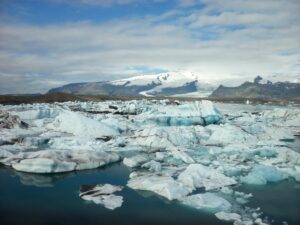Deserts are those places where it’s super dry and sandy, like the Sahara or the Arabian Desert. But if you look at a map, you’ll see that Europe doesn’t have big deserts like that. There are a few important reasons why Europe doesn’t have deserts.
1. It’s Location:
Europe’s strategic location is surrounded by expansive water bodies, such as the vast Atlantic Ocean and the tranquil Mediterranean Sea. These immense water masses play a pivotal role in shaping the region’s climate, contributing to its balanced and temperate nature. They act as natural regulators, preventing Europe from experiencing extreme heat and aridity.
Deserts require specific conditions, including scorching temperatures and arid environments. Europe’s abundant water sources and moderate climate don’t provide these conditions. The cooling influence of the Atlantic Ocean and the temperate Mediterranean Sea ensures Europe remains safeguarded from the formation of deserts. This geographical makeup ensures Europe’s diverse range of climates and landscapes, making it a unique and hospitable continent.
2. The Weather:
In contrast, deserts are notorious for their scorching heat and arid environments, which are diametrically opposed to Europe’s temperate conditions. The presence of oceans and currents ensures that Europe doesn’t experience the searing heat and extreme dryness typical of desert regions. Consequently, Europe enjoys a climate that is far more moderate and hospitable, making it a unique and comfortable place to live.
3. Mountains and Hills:
Europe is graced with an abundance of mountain ranges and hills, including iconic landmarks such as the majestic Alps and the rugged Pyrenees. These geographical features serve as nature’s own protective barriers, effectively obstructing the advance of hot, dry winds that are instrumental in the creation of deserts. By acting as formidable windbreaks, these mountain ranges prevent the expansion of desertification across the continent.
In contrast, other continents, like Africa and Asia, which house extensive deserts, lack such imposing mountain ranges in the same capacity as Europe. This distinction highlights the vital role that Europe’s mountainous terrain plays in preserving the continent’s temperate and habitable climate, setting it apart from arid desert landscapes found elsewhere on the globe.
4. History:
In the annals of history, Europe witnessed a transformative period during the Ice Age, when its landscapes were blanketed in ice and snow. As the icy grip of the glaciers gradually relinquished its hold, it bestowed Europe with a wealth of fertile soil and an intricate network of rivers and lakes. This legacy of melting ice remains a treasure trove for the continent, as it provides the ideal conditions for agriculture and sustains Europe’s lush, verdant landscapes.
The rich soils deposited by the retreating ice sheets and the abundance of freshwater sources, in the form of rivers and lakes, are essential in preventing the continent from succumbing to the harsh arid conditions of a desert. Instead, they have nurtured a thriving environment and supported a diverse range of flora and fauna, contributing to Europe’s unique and bountiful ecosystems.
5. People and Farming:
Europe has harbored human communities for countless generations, spanning millennia, and these inhabitants have been cultivating the land for thousands of years. Through their enduring stewardship, they have diligently tended to the soil, ensuring its ongoing fertility and guarding against the encroachment of desertification.
The legacy of sustainable land management, spanning generations, has been pivotal in safeguarding Europe’s soil from degradation and preserving its lush and productive qualities. This sustained agricultural tradition has played a crucial role in preventing the transformation of European landscapes into barren deserts, thus ensuring the continent remains a fertile and hospitable place for its people.
Conclusion
In simple terms, Europe’s location, weather, mountains, history, and human activity have all played a part in keeping it free from deserts. Instead, Europe is known for its lush landscapes, forests, and a history of human civilization that has nurtured its fertile lands. So, even though Europe doesn’t have deserts, it’s a unique and diverse place in its own way.






